Rules and nuances of watering beets: a step-by-step guide for novice vegetable growers
Beets are an unpretentious vegetable crop, but they need proper and timely watering. For example, frequent irrigation leads to rotting of the plant, and infrequent irrigation leads to deformation and unripeness of the fruit.
How often to water beets, whether you need to follow a certain pattern, what other nuances there are - we’ll figure it out in the article.
How to properly water beets in open ground
How to water beets? This question interests many novice summer residents. First of all, take into account the time, frequency and abundance of irrigation.
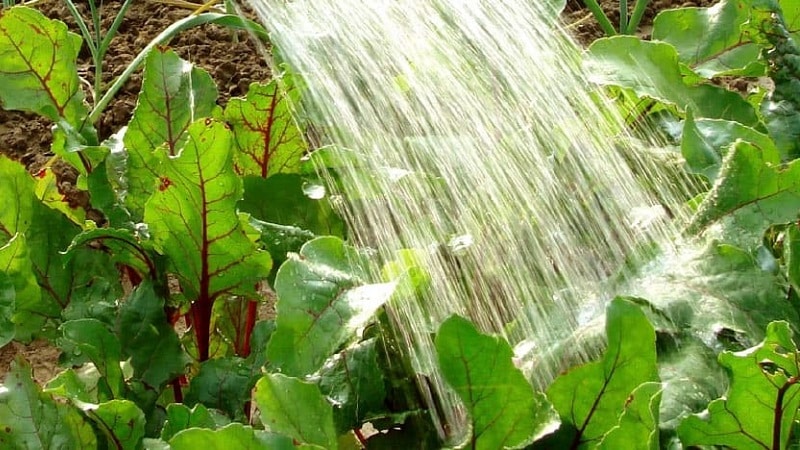
Time, frequency and abundance of watering
Since beets are able to accumulate liquid, they do not need frequent watering. Severe waterlogging of the soil harms the root crop - it rots or becomes diseased.
Beets in open ground are watered once a week, preferably in the evening.. This way the moisture will go into the soil, which will provide nutrition to the root crops. About 15-20 liters of water are used per square meter, depending on the weather. The hotter it is, the more water is lost.
Reference. Adult plants can go without watering for two weeks. But this is an extreme - do not forget about timely irrigation.
Irrigation methods
There are three ways to water beets: manual, drip and sprinkler.
Manual watering method
Manual watering is a simple method, this humidification using a watering can or hose.
Watering can. When watering from a watering can, make sure that the irrigation is uniform. This also applies to water pressure. A strong jet damages seedlings and erodes the ground.To prevent this, special nozzles are used. The watering can is suitable for a small area.
Hose. When watering with a hose, special nozzles are also used that will prevent the soil from being washed away and damaging the sprouts. This method allows you to moisten a larger area.
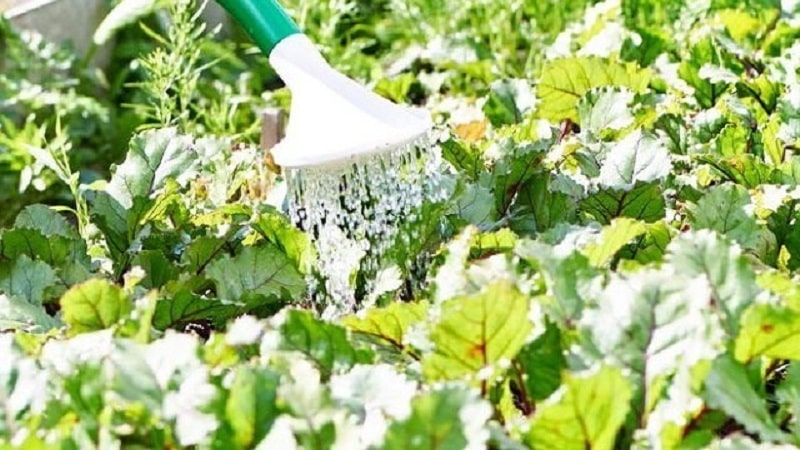
Drip irrigation method
Drip irrigation is used when it is necessary to cover a large area.. Water is supplied to the roots of plants individually through special pipes or hoses with holes.
Important! Choose pipes that can withstand high water pressure. Otherwise they won't last long.
This method requires significant costs.
Sprinkling
Sprinkling is also used to irrigate beets. Drops that fall on the tops do not harm the plant.
In this case, the area is equipped with water sprinklers. The soil becomes evenly moistened and does not require loosening after watering. This method is also costly and is suitable for a large area.
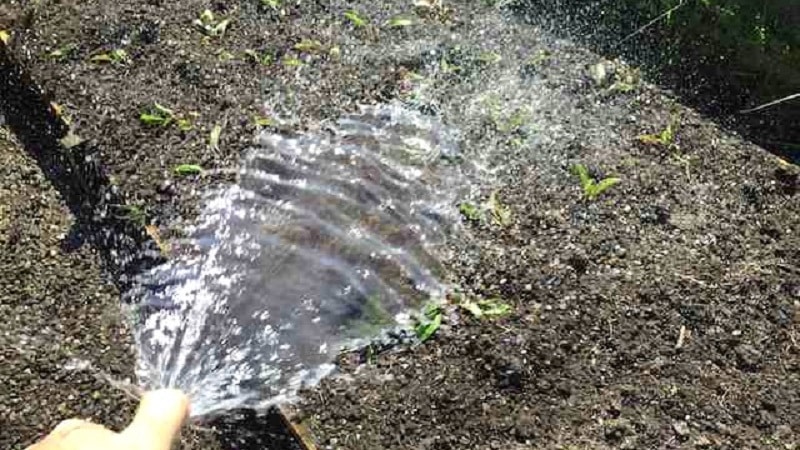
Water requirements
Water for watering beets should be settled, temperature +16…+23°C. Tap water contains chlorine, so leave it for 24 hours before watering. Well and artesian water are suitable for irrigation, also after the settling procedure.
Reference. To prevent water from stagnating in the hole, small holes are made in the ground near the plant.
Features of watering
Depending on the growing season, beets need different frequency and volume of watering. Weather conditions also affect the amount of irrigation. If watering at one of these stages was incorrect, this affects the taste of the root crop.
It can be useful:
Growing table beets: from choosing a variety to harvesting
Depending on the period
Landing. Before how to plant seeds, the ground is well watered. After planting, the beets are irrigated once a week. If the weather is hot, then the frequency of watering is increased. For 1 sq. m use 3-4 liters of water. At this stage, you should not irrigate the soil too much; water it as it dries.
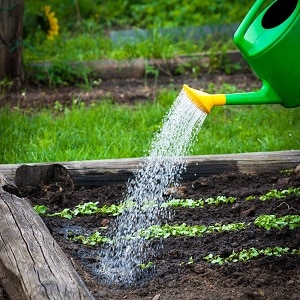 Flowering and appearance of the first shoots. When the first shoots appear, the beets begin to be watered 2-3 times a week, depending on weather conditions. For 1 sq. m use about 10 liters of water. This continues until the sprouts reach a height of 15 cm and the first leaves appear on them. After this, the frequency of watering the plant is once a week.
Flowering and appearance of the first shoots. When the first shoots appear, the beets begin to be watered 2-3 times a week, depending on weather conditions. For 1 sq. m use about 10 liters of water. This continues until the sprouts reach a height of 15 cm and the first leaves appear on them. After this, the frequency of watering the plant is once a week.
Fruit formation. Root crops are watered once every 7-10 days. The volume of water is increased to 15 liters per 1 square. m, hot days - up to 20 liters of water.
After feeding. At each stage of development, the plant needs feeding. These can be mineral and organic solutions containing nitrogen, potassium and phosphorus. For root feeding, the solution is poured directly under the root; for foliar feeding, the leaves are irrigated.
When the plant has 4-5 leaves, beets are fertilized with boric acid - the leaves are sprayed with the solution. To do this, dissolve 4 g of boric acid in 10 liters of water. With a lack of boron, fomosis develops and the core of the root crop rots.
Depending on the month
In the second half of May Beet seeds are planted in the soil - the ground is watered before and after planting.
In June Beets are watered once a week. Use 10-15 liters of water per 1 sq. m.
Important! The first month of the growing season is especially important: if the plant does not receive enough moisture, it will stop in its development.
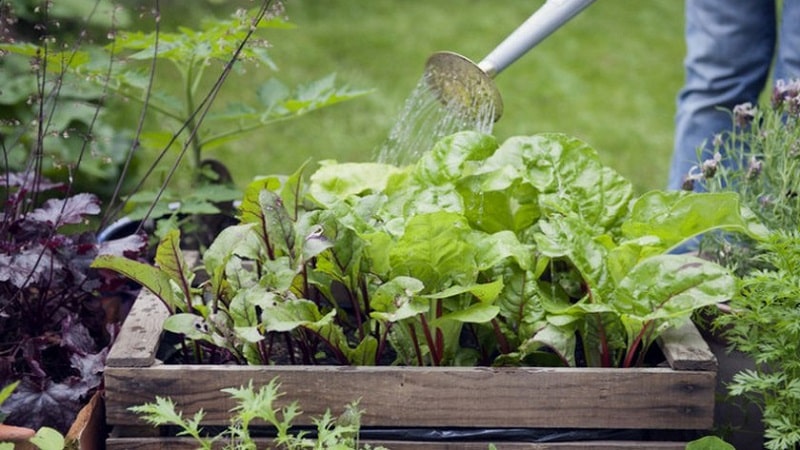
In July – in the first half of August, the plant is watered 1-2 times a week.During this period, abundant watering is needed, since the root crop is already fed at a depth of more than 15 cm. Per 1 sq. m use two buckets of water.
Mid or late August Watering is stopped so that the fruits form and become juicy.
Depending on weather conditions
Climatic conditions directly affect the frequency of watering beets:
- Heat. In hot weather, the frequency of watering is doubled. Irrigate the plant every 3-5 days. More water is consumed. If the norm is 15 liters, then in hot weather use 20 liters per 1 square meter. m. However, do not overfill.
- Rain. In conditions of heavy rainfall, beets do not need frequent watering.
- In cold weather, beets are watered only in the morning and lunchtime. The frequency of watering depends on the degree of drying of the soil.
When to stop watering
Watering root crops stop 3-4 weeks before harvest.
If you continue to water the beets, the fruits will not be able to form and accumulate sugar, and will become sick and tasteless.
How to learn to determine the moisture needs of beets
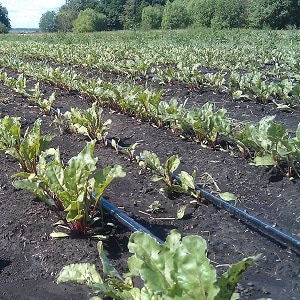 Each gardener himself determines whether the root crop needs irrigation or not. The needs of the crop depend on the appearance of the plant and the soil itself - it should be moist, but not wet.
Each gardener himself determines whether the root crop needs irrigation or not. The needs of the crop depend on the appearance of the plant and the soil itself - it should be moist, but not wet.
Use your finger to check the depth of the moistened layer of soil in several places.: If the soil is moist to a depth of 5 cm, then there is no need for watering.
The second way is with a shovel. Stick it into the ground next to the root crop: if there is dirt stuck to the shovel, moisturizing is not required.
Read also:
How to thin beets correctly: stages of manipulation
Is it possible to pick off leaves from beets while they are growing?
Tips and recommendations from experienced summer residents
People with experience It is recommended to follow the following rules:
- There is no need to water the plants a little every day - the root crops do not receive enough moisture. The liquid evaporates quickly from the surface, and the beets do not absorb it.
- The first nutritional supplement is applied two days after sowing. Two glasses of wood ash are dissolved in a bucket of warm water. Leave for three hours and water the culture with this solution. Feeding will deliver nutrients directly to the root of the plant.
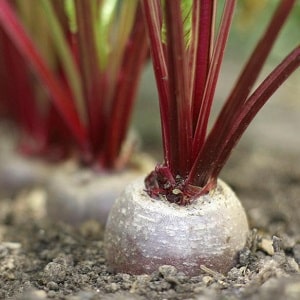 Water is poured onto the bed itself. Make sure that it does not spread over the tops - this way, the water will get into the soil, and you will prevent the occurrence of fungal infections.
Water is poured onto the bed itself. Make sure that it does not spread over the tops - this way, the water will get into the soil, and you will prevent the occurrence of fungal infections.- To increase the concentration of sugar in the root crop, beets are watered with table salt and boric acid in June and August. During salt procedures (a level tablespoon of salt per 10 liters of water), the plants are also fed with fertilizers containing potassium.
- If the soil on the site is acidic, carry out one watering per season containing lime. At this point, the plant must have formed at least four leaves. For 12 liters of water use 250 g of lime. Fertilizer is applied strictly at the root, without dripping onto the tops.
Conclusion
Beets need rare but abundant watering. Frequent irrigation leads to rotting and death of the root crop. Water the beets depending on the period and weather conditions, but always with warm and settled water.
Depending on the area of the plot, one of three methods is chosen: manual watering, drip watering, sprinkling. 3-4 weeks before harvesting, stop watering the beets so that they become juicy.